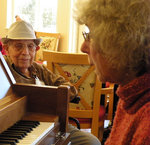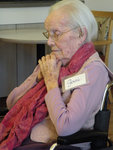Cathi Jackson starts singing as Nan Toby Tyrrell plays the piano at San Juan Villa in Port Townsend. A handful of others join in.
As life enrichment coordinator at the dementia care center, …
This item is available in full to subscribers.
We have recently launched a new and improved website. To continue reading, you will need to either log into your subscriber account, or purchase a new subscription.
If you had an active account on our previous website, then you have an account here. Simply reset your password to regain access to your account.
If you did not have an account on our previous website, but are a current print subscriber, click here to set up your website account.
Otherwise, click here to view your options for subscribing.
* Having trouble? Call our circulation department at 360-385-2900, or email our support.
Please log in to continue |
|


Cathi Jackson starts singing as Nan Toby Tyrrell plays the piano at San Juan Villa in Port Townsend. A handful of others join in.
As life enrichment coordinator at the dementia care center, Jackson welcomes musicians like Tyrrell and she puts on “free concerts,” as she calls them, as often as possible, because music helps with memory and gives residents a way to connect with one another.
“Everyone engages in these,” says Jackson of the concerts, which feature performers ranging from pianists like Tyrrell to fiddlers to harpists and guitarists and even a clogger.
On a warm September day, Tyrrell has come to play piano, as she does regularly. Jackson introduces Tyrrell as if she were about to give a concert on stage.
Tyrrell announces some of the songs she's about to play, including several from “Fiddler on the Roof” and “The Sound of Music.” People start humming when they hear “My Favorite Things.”
Bill Hansen sits in the back initially, but is happy to move to be closer to the piano.
Tyrrell introduces herself to Hansen. It's clear Hansen knows the words to the songs she's playing.
Jackson makes a point of inviting the Port Ludlow Singers as often as she can because Hansen once sang with that organization.
“Now I'm going to do my Rodgers and Hammerstein,” says Tyrrell.
One woman comes up to Jackson and wants to know how much the concert costs today. She doesn't have any money.
“Well, lucky for you the concert is free,” says Jackson. “Free food, free friendship and free music.”
The woman is thrilled and sits down. “Have a snack,” invites Jackson as Tyrrell plays “Some Enchanted Evening.”
In front of Tyrrell sits Bruno L., who appears to be slouching and not listening.
“It looks like he's asleep, but he's listening,” Jackson says.
Sure enough, a few minutes later, Bruno perks up and shoots an appreciative smile at Jackson.
Ralph Stark, 99, smiles a lot and is interested in the music, but scoots up to Jackson and asks when his sister, Ethel, is coming to the concert.
“Ethel was a good singer,” Stark tells Jackson. “We'll find her,” says Jackson.
A few songs later, Stark asks Jackson again when his sister is coming. Jackson tells him she rode the bus today and will be a little late. So he goes back to listening to the music.
By now, Tyrrell is talking about “Edelweiss,” reminding listeners that the popular song is also the name of a flower.
Jackson asks if Stark has a favorite song, and Tyrrell starts playing it. Others softly join in to the tune “Day by Day,” from the musical “Godspell,” then the song “Kumbaya.”
Jackson attends to the needs of about a dozen dementia residents, answering questions, engaging in conversation, sitting next to someone who is lonely, and often singing while she does it.
She points to a book, “Lifesaving Songs and Poems,” a resource guide for caregivers, which she uses regularly.
“Music and rhythm are the 'bottom line' when all other forms of communication cease, because they touch basic human makeup as elemental as the heartbeat and our oldest, longest memories, which have the deepest imprint,” the book says.
Jackson says she especially likes it when those performing, like Tyrrell, remember to use the names of the residents in the songs and engage them personally while performing.
YOUTUBE, BOOM BOX
It's not just people coming in to share their talents in concerts these days, Jackson said.
“YouTube has opened up a whole new world. Now I have this big-screen TV, and they can sing along,” she said.
“If people get grumpy and don't want to do what we had planned, it's 'Let's sing.' You never get anyone who doesn't want to sing.”
“They like 'Home on the Range.' And did you know there were words to ‘Taps’? I didn't. They'll sing them to me.”
The "Lifesaving Songs" resource guide has all kinds of songs in it, many that the 52-year-old enrichment coordinator had never heard before.
“We just recently discovered ‘Polly-wolly-doodle all the day,’” she said. It's a song Shirley Temple sang in 1935.
And if she wants people to come to her, Jackson says, “I just plant myself in the hallway with a boom box and they'll come to me.”
Lately, she says, music has been used to motivate people to come to lunch and dinner.
“It's a way to get them to meals. I do a fake tap dance and they start gravitating toward dinner.”
“The beautiful thing about dementia is that you can sing all these songs today and tomorrow; it's not like ‘Nah, we already did this.’”
“I think they came from a time when they didn't have TV and people did play music in their homes. If you had a family with eight kids and everyone played an instrument, you had a band,” Jackson says.
Jackson notes that people move to the care center from all walks of life and all have different backgrounds, some even speaking different languages.
“You start putting on a song and everyone knows that song, and it brings us together.”